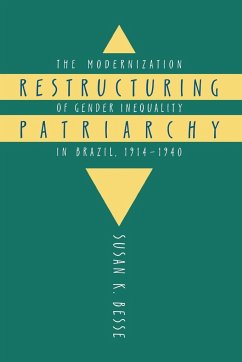Susan K. Besse broadens our understanding of the political by establishing the relevance of gender for the construction of state hegemony in Brazil after World War I. Restructuring Patriarchy demonstrates that the consolidation and legitimization of power by President Getulio Vargas's Estado Novo depended to a large extent on the reorganization of social relations in the private sphere. New expectations and patterns of behavior for women emerged in postwar Brazil from heated debates between men and women, housewives and career women, feminists and antifeminists, reformist professionals and conservative clerics, and industrialists and bureaucrats. But as urban middle- and upper-class women challenged patriarchal authority at home and assumed new roles in public, prominent intellectuals, professionals, and politicians defined and imposed new 'hygienic,' rational, and scientific gender norms. Thus, modernization of the gender system within Brazil's rising urban-industrial society accommodated new necessities and opportunities for women without fundamentally changing the gender inequality that underlay the larger structure of social inequality in Brazil.
Hinweis: Dieser Artikel kann nur an eine deutsche Lieferadresse ausgeliefert werden.
Hinweis: Dieser Artikel kann nur an eine deutsche Lieferadresse ausgeliefert werden.







